Fiction does not exist. By definition, it is fancy; material created by human beings to tell stories, offer escapes, entertain, or teach lessons. It can be argued that the best of fiction does all these things, with only the great examples providing insight to how to approach real life. It is in this spirit that I turn again to Avatar: the Last Airbender, a cartoon that was so much more than (I think) anyone expected. I have already written an article on the real world wisdom to be learned from the character of Iroh. Now let’s examine another character, one who provided drastically different lessons. In the Avatar universe, no villain was more complete, more fully human, and therefore more relatable than Azula.
For those unfamiliar with the show, Azula is a princess of the Fire Nation (the bad guy). She is royalty, born and raised. She is also intelligent, a perfectionist, cunning, and fiercely determined. None of these traits are innately evil, but Azula suffers from being “out of balance,” a condition that all the villains in the Avatar universe share. What this means is that Azula pursues these traits too far, and at the sacrifice of others. This makes her cruel, selfish, and extremely controlling/manipulative. It also makes her incredibly successful, at least to herself. However, in a way that is incredibly relatable to our own non-bending world, Azula’s lifestyle leads to unhappiness, first for others and then herself.
Azula’s biggest vice is her control. Everyone is a little controlling, it reflects a natural desire to feel at peace in the world around you. Some control offers security and a feeling of well-being. Azula drives it negative by turning it to manipulation. She is a character who cannot trust, and therefore cannot understand when people do. She has “friends,” but only so far as people she feels she can keep under her thumb.
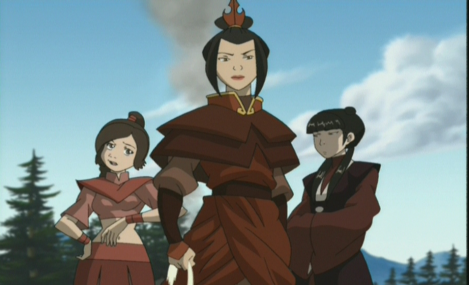
Azula’s chief companions are Mai and Ty Lee. Ty Lee only joins Azula after being forced. Both are recruited rather than asked to help.
The show does depict a closer friendship between Azula and Ty Lee. In the episode, “The Beach,” Azula does a rare break in character. She admits feeling jealously towards Ty Lee, namely the male attention her friend is receiving. Yet Azula cannot fully admit a flaw, as it would break from her image of herself as the perfect princess (perfectionist pushed too far). For the most part, Mai and Ty Lee are not treated as equals, but rather as lackeys. Azula does not value their opinion or often listen to their advice.
This might be evil if it weren’t so sad. Through her actions, Azula is isolating herself from other people. She is consumed by her image and perceived identity as “the princess.” She relishes in power over others, even at the expense of feeling genuine connections. These she does not trust and perceives as weakness. Rather than admit a flaw, she lashes out at all of those around her. This ultimately drives her “friends” to turn on her, leading Azula to grow incredibly paranoid and depressed rather than admit she made a mistake.
Another tragedy of Azula is her lack of growth. She is a cautionary tale of life spent too long in “the comfort zone.” Unlike her brother, Zuko, Azula never struggled with anything in her life until the betrayal of Mai and Ty Lee. Everything came easy to her. While this earned Azula respect and gained her responsibility, it meant that she was never challenged either, and never was able to grow as a person. Everyone is able to excel in conditions where they don’t feel threatened. Most don’t find out who they really are until they are challenged or broken. They will either grow, learning a new and deeper understanding of themselves (as Avatar Korra did) or they will be consumed by their own mind. Azula met this tragic fate.
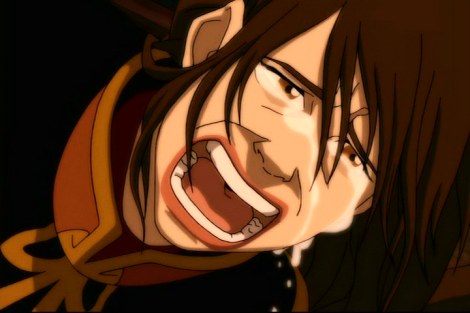
When her world collapses and Azula is left alone and with no one to blame but herself, her sanity breaks. Since her mind cannot admit a problem, it is her body that exposes her inner despair.
Azula is the cautionary tale of someone who follows too far in the vein of who she was born to be rather than ever becoming the person she is. Every problem in her life was laid in infancy, from her non-existent relationship with her mother to an abusive father who taught her that manipulation was a way of life and trust was the path of foolishness. Azula grew in this world of propaganda (the Fire Nation being fully justified in the war) and isolation. It only really showed at one point in the show, but it was enough to show the audience just how unsuited Azula was to anything that didn’t revolve around the war.
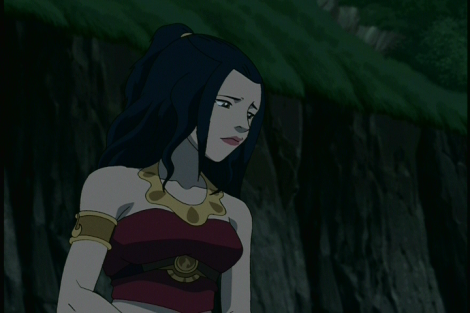
In a rare moment, Azula’s armor comes down and the audience bears witness to an incredibly awkward, alone teenager who really has no idea who she is in the normal world.
Perhaps there is no better way to illustrate the lesson than in the perspective of Zuko. In the beginning of the series, Zuko is clearly jealous of his sister, and the favoritism she receives. By series’ end however, he regards his banishment as “the greatest thing [that could have been] done for [his] life.” A pity that Azula never was banished. A pity that she could never escape.
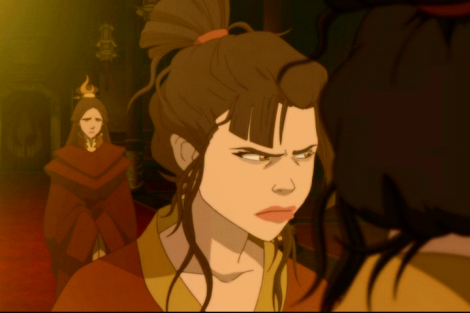
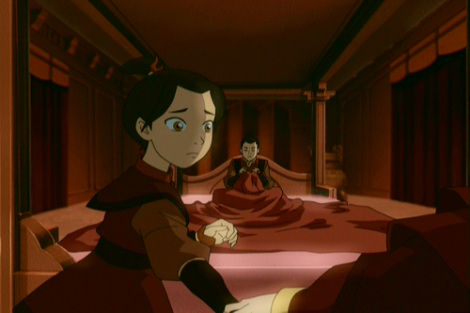
Pingback: “Why am I so bad at being good?”: the Encouraging Wisdom of Zuko | The Red Rings of Redemption·